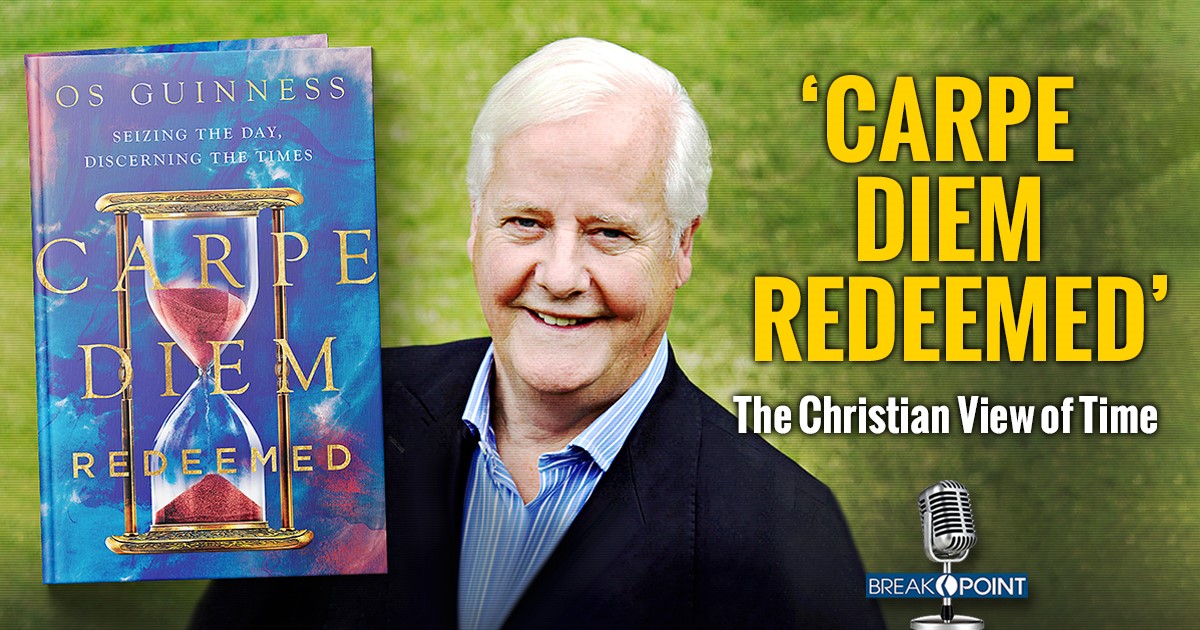


One of my all-time favorite quotes comes from Abraham Kuyper and was repeated over and over by Chuck Colson: “There’s not a single square inch in the whole domain of our human existence over which Christ, who is Sovereign over all, does not cry out: ‘Mine!’” Working out the implications of that grand truth in the reality of our everyday lives will take a lifetime.
As Christians, we often acknowledge Christ’s rule over things like human dignity, marriage, and maybe even our finances, but we often miss how central a Christian view of time is to a truly Christian worldview. Thus, we often find our time hijacked, assumed, taken for granted, killed, wasted, and even forgotten.
Os Guinness thinks it’s time to change our view of time. His new book, “Carpe Diem Redeemed: Seizing the Day, Discerning the Times,” explores and explains how different views of time shape our culture and our individual lives.
For example, Eastern religions embrace a cyclical view of time. “All that is, once was, and will be over again.” In this conception, history runs like a wheel, forever returning to the same point. Even we, in a sense, will return according to this view, reincarnated according to the dictates of Karma.
The cyclical view ultimately robs our lives of meaning, because our choices change nothing. Time and everything in it are illusions. Salvation consists of escaping the cycle, and along with it, every love, longing, and purpose we know as human beings.
The “chronological” view of time is the one that dominates our culture, according to Guinness, and is held by both optimists and pessimists. Enlightenment thinkers, and many secularists today, see time as that inevitable, upward march toward greater knowledge, peace, and civilization. We started as apes, but we’re on our way to becoming ‘gods.’
After two world wars, the Holocaust, Communism, and Islamic terrorism, chronological optimists are, well, more rare than they used to be. More common, especially in popular culture, are chronological pessimists. They, to quote Shakespeare, view time and history as “a tale, told by an idiot, full of sound and fury, signifying nothing.”
For the chronological pessimists, all that’s left is to “seize the day” in that Dave Matthews and “Dead Poets Society” sort of way. In other words, live it up while we can… for tomorrow we die.
What so many Christians miss is just how revolutionary the Judeo-Christian view of time is, over and against these other views. Guinness calls it a “covenantal” understanding of time, the view that the structure and purpose of history have been revealed by a God who stands outside of it, having created it. Genesis’ opening line, “In the beginning, God…” frames this view, and the rest of Scripture points to a grand purpose which is being wrought by our Creator, in partnership with His image-bearers.
The covenantal view of time is the unique contribution of the Judeo-Christian worldview. History’s goal is neither utopian fantasy nor nihilistic despair. Even history’s darkest evils cannot thwart that for which time was instituted. And we, as humans, have a part to play. Our actions matter.
“Human enterprise has significance and solidity…” Guinness writes, “under and alongside God, history is transformed from terror into task.”
Grasping this view of time allows us to live what Guinness calls “prophetically untimely” lives precisely because we know how the story ends. But Guinness also goes beyond the heady theories to offer practical ideas on how to rightly seize the day, how to break our “slavery to the clock,” to work and rest and worship in light of this Christian understanding of time.
You can request a copy of “Redeeming Carpe Diem: Seizing the Day, Discerning the Times” with your next donation to the Colson Center. And you can hear more about it directly from Os Guinness himself on a free Colson Center webinar, tomorrow at 1:00 pm ET. If the time doesn’t work, you’ll still want to register here to get a recording of the session with Os Guinness.
Topics
Books
Christian Living
Christian Worldview
Colson_Links
Culture/Institutions
Education
Ethics
History
Inspiration
Os Guinness
Religion & Society
The Bible
Theology
Worldview
Have a Follow-up Question?
Up
Next

Related Content

© Copyright 2020, All Rights Reserved.













